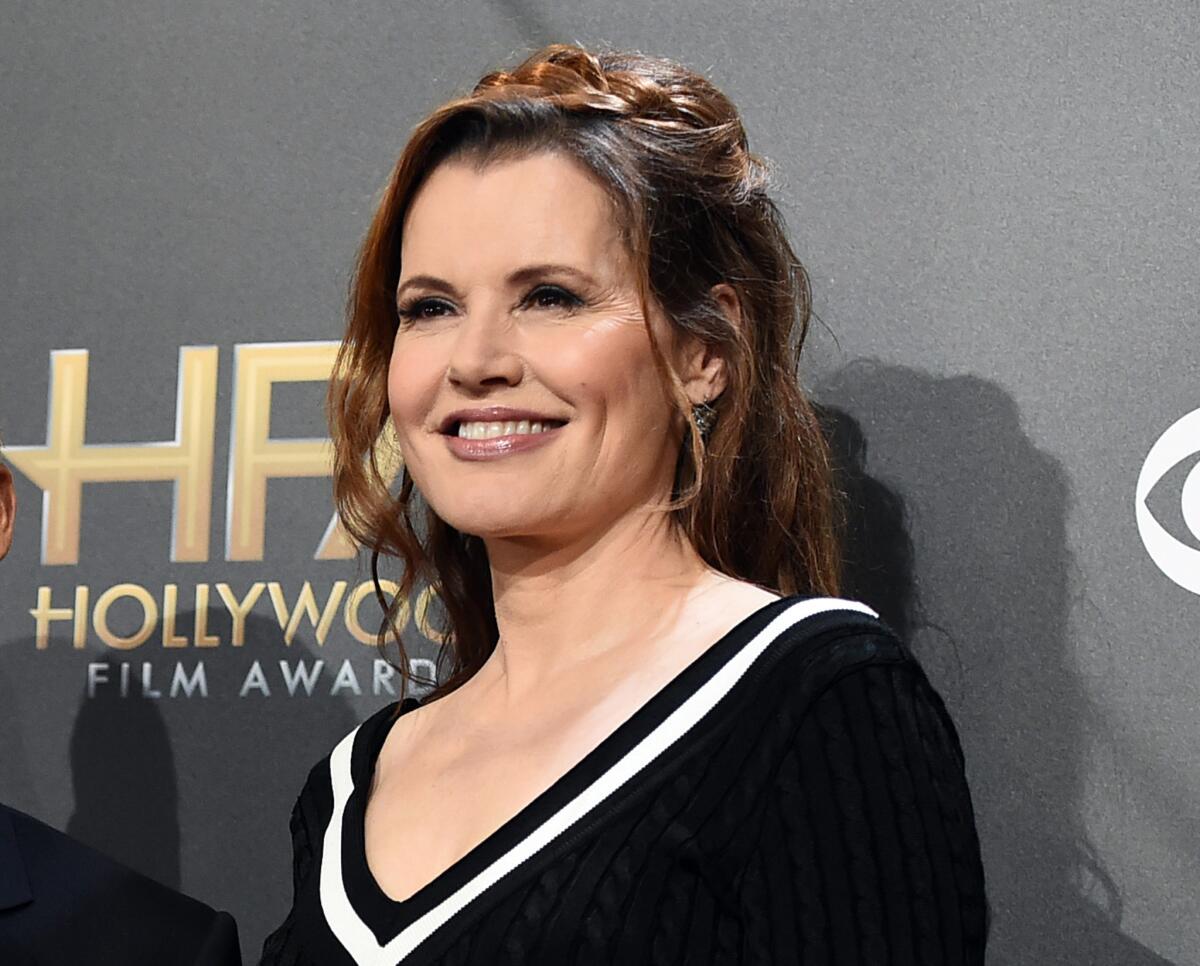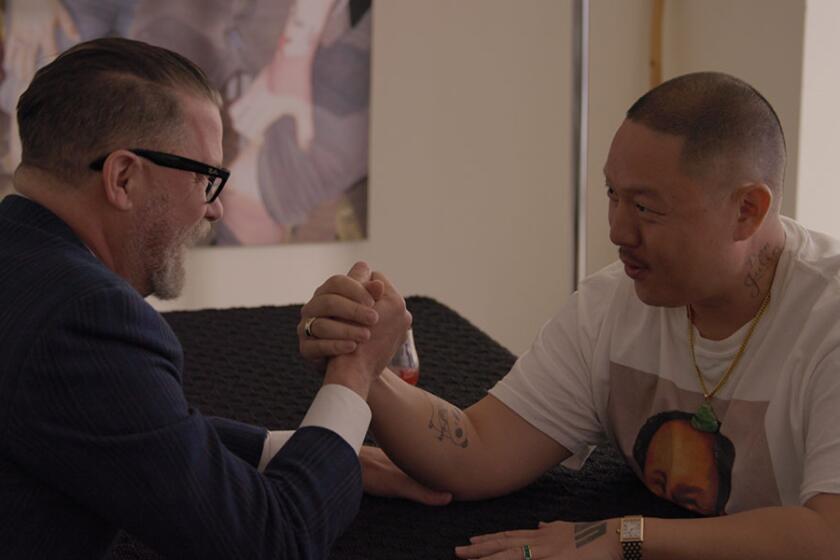Bentonville Film Festival pushes diversity message from year one

Geena Davis launched a film festival focused on women and diversity in Bentonville, Arkansas, that screened about 75 films.
BENTONVILLE, Ark. — The first Bentonville Film Festival is a little festival with big aspirations and deep pockets.
The aspirations come from Geena Davis — or, more precisely, the Geena Davis Institute on Gender in Media, a research-based advocacy group that tackles issues of gender inequality and stereotyping, particularly in family-oriented movies and TV.
The deep pockets come from Wal-Mart. The giant retailer is headquartered here, and the corporation was a major sponsor of the five-day festival last week.
The mission of BFF (as festival organizers like to call it) is to champion women and overall diversity in the media. During the opening party, Davis told the crowd that she had been appalled when she started watching kids shows with her then-young daughter.
“We are teaching kids from the very beginning that girls are less important,” Davis said. “We are showing entertainment where girls are sidelined, one-dimensional, stereotyped and very often hypersexualized.”
With her tough-chick “Thelma and Louise” mojo, Mensa-caliber mind, Olympic-archer precision and cunning sense of humor, Davis seems like the ideal insider to shake things up in the film world. Which is what festival co-director Trevor Drinkwater no doubt had in mind when he asked Davis to start a film festival with him.
It was Drinkwater, a movie producer and executive, and Louis Greth, the senior director of movies at Wal-Mart, who conceived of a women and diversity film festival. They then invited Davis to be a partner at the festival, which would be held in Bentonville. Drinkwater and Davis know each other from Los Angeles and have kids the same age who play together, and he coaches Davis’ daughter’s soccer team.
There were 46 films in competition, mostly of the upbeat and redemptive sort — this was mostly a PG film festival. After four days of screenings and panels, the festival ended Friday night with a gala award ceremony hosted by Nick Cannon and Soledad O’Brien. Award presenters included Courtney Cox, Rosie O’Donnell, Bruce Dern and Judge Reinhold, who jokingly called himself “the obligatory white male.”
“Jack of the Red Hearts,” Janet Grillo’s film about an autistic girl and the wayward young identity thief who connects with her, won the jury award. The documentary prize went to “In My Father’s House,” directed by Ricki Stern and Annie Sundberg. The film follows rapper Che “Rhymefest” Smith, who reconnects, after 20 years, with a father he thought had died but was instead living on the streets on Chicago’s South Side.
“Meet the Patels,” a documentary that filmmaker and star Ravi Patel called a romantic comedy that happens be a documentary, won the festival’s diversity award. The documentary, shot and co-directed by his sister Geeta Patel, follows Ravi’s attempts to please his parents and find a nice Indian wife.
BFF organizers boasted that the festival is unique in that it guarantees distribution of some sort to the winning films. These films will get a theatrical release on an AMC screen (AMC is also a sponsor), on the Lifetime Channel, on DVD in Wal-Mart stores or as digital releases on Vudu (which is owned by Wal-Mart.)
The corporate presence was hard to miss. Wal-Mart executives were on the panels, on the programming committee and on the jury board. There were M&M mascots, a walking Planters Peanut and an Oscar Mayer wiener bus; festivalgoers were treated to manicures and makeup touch-ups at the VIB (very important beauty) lounge. (The festival estimates that total attendance was 35,000 to 40,000.)
Some of those in attendance questioned whether the corporate presence undermined the mission of the festival, but Drinkwater dismissed that criticism.
“That Wal-Mart wants to stand up and support a festival that supports women and diversity is what should be celebrated,” he said, adding that its support “allows us to do things that other festivals can’t.”
Some of these things included Davis and O’Donnell coaching a baseball game, followed by a ballpark screening of their beloved 1992 girl-power flick, “A League of Their Own.” The great-grandkids of Georg and Maria Von Trapp participated in a tribute to “The Sound of Music.”
Davis, O’Donnell, Alysia Reiner (from “Orange Is the New Black”) and Khandi Alexander (“Scandal”) participated in a lively table-read of famous male-centric films such as “Swingers” and “Planes, Trains and Automobiles” to prove that the female voices do not really change the content of a movie.
Drinkwater noted that when Davis starred in “Stuart Little,” she asked the director if some of the boys racing remote-control model boats couldn’t be swapped with the clapping girls who stood behind them. The director was happy to make the switch. Davis said she believes that so much of the imbalance is due to unconscious bias.
The panel discussions were often better attended than the films. Among the panelists were director Catherine Hardwicke (“Twilight”), DreamWorks co-founder Jeffrey Katzenberg (who made a surprise appearance and spoke about digital storytelling), along with representatives from Google, YouTube and even the White House.
Emily Best, founder and chief executive of the filmmaker crowd-funding platform Seed&Spark, said she was “very excited by the idea of a film festival that, rather than patting itself on the back for having 25% female-directed films one year, was putting the focus on diverse voices.” She added, though, that she was troubled that the main sponsor of a festival about women and diversity was a brand “whose track record on that front is anything but impressive.”
But Australian screenwriter and actress Robyn Butler said she had an “extremely positive” experience at the festival. Her funny and (for this festival) edgy screwball comedy, “Now Add Honey,” starring Portia Di Rossi as a pill-popping, erratic mother/manager to a teen star (Lucy Fry), was directed by her husband, Wayne Hope.
As Butler said of the Wal-Mart involvement: “I felt grateful that someone was putting their money where their mouth was.”
More to Read
Only good movies
Get the Indie Focus newsletter, Mark Olsen's weekly guide to the world of cinema.
You may occasionally receive promotional content from the Los Angeles Times.










